|
| | Mathison Museum of Natural History |  |
|
+15Caracal widukind lucky luke Megaptera rogerpgvg Jill sunny pipsxlch Saarlooswolfhound landrover Kikimalou Taos Duck-Anch-Amun Shanti Saien 19 posters | |
| Author | Message |
|---|
Saarlooswolfhound
Moderator

Country/State : USA
Age : 28
Joined : 2012-06-16
Posts : 12055
 |  Subject: Re: Mathison Museum of Natural History Subject: Re: Mathison Museum of Natural History  Mon May 15, 2023 5:52 pm Mon May 15, 2023 5:52 pm | |
| A really stunning frog, truly. I recently got one and I adore it. _________________ -"I loathe people who keep dogs. They are cowards who haven’t got the guts to bite people themselves."-August Strindberg (However, anyone who knows me knows I love dogs [You must be registered and logged in to see this image.] ) -“We can try to kill all that is native, string it up by its hind legs for all to see, but spirit howls and wildness endures.”-Anonymous |
|   | | widukind
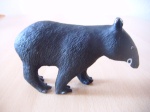
Country/State : Germany
Age : 48
Joined : 2010-12-30
Posts : 45745
 |  Subject: Re: Mathison Museum of Natural History Subject: Re: Mathison Museum of Natural History  Mon May 15, 2023 6:19 pm Mon May 15, 2023 6:19 pm | |
| |
|   | | Jill

Country/State : USA
Age : 39
Joined : 2021-04-13
Posts : 2349
 |  Subject: Re: Mathison Museum of Natural History Subject: Re: Mathison Museum of Natural History  Mon May 15, 2023 9:38 pm Mon May 15, 2023 9:38 pm | |
| |
|   | | bmathison1972
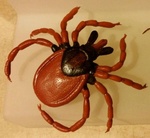
Country/State : Salt Lake City, UT
Age : 52
Joined : 2010-04-13
Posts : 6709
 |  Subject: Re: Mathison Museum of Natural History Subject: Re: Mathison Museum of Natural History  Tue May 16, 2023 2:05 pm Tue May 16, 2023 2:05 pm | |
| - Saarlooswolfhound wrote:
- A really stunning frog, truly. I recently got one and I adore it.
Bullyland does a good job on invertebrates and small animals like this, much moreso than they do 'wildlife' Next up: Species: Carabus auratus Linnaeus, 1761 Common name(s): golden ground beetle About the Figure: Manufacturer: Kaiyodo Series: Souvenirs Entomologiques Year of Production: 2005 Size/Scale: Bottlecap base 3.3 cm in diameter. Total figure height approximately 3.5 cm. Body length approximately 2.5 cm, within scale 1:1 Frequency of species in toy/figure form (at time of posting): Very rare Miscellaneous Notes: It's been too long since I purchased this to remember if the beetle comes safely off of its snail prey and base. Bullyland had previously produced two versions of this species (one in blue and one in green) in 1994. About the Animal: Geographic distribution: Western and Central Europe; naturalized in North America (New England area) Habitat: Grasslands, fields, agricultural fields, parks and gardens; often in areas with loamy soil Diet: Snails and slugs, earthworms, soft-bodied insects IUCN Status (at time of posting): Not Evaluated Miscellaneous Notes: Carabus auratus was introduced to the Boston area in the United States in the 1940s for control of the gypsy moth ( Lymantria dispar). It has continued to spread north, being documented as far north as Maine in the United States (1987) and New Brunswick in Canada (2015). [You must be registered and logged in to see this image.] |
|   | | widukind

Country/State : Germany
Age : 48
Joined : 2010-12-30
Posts : 45745
 |  Subject: Re: Mathison Museum of Natural History Subject: Re: Mathison Museum of Natural History  Tue May 16, 2023 2:08 pm Tue May 16, 2023 2:08 pm | |
| |
|   | | bmathison1972

Country/State : Salt Lake City, UT
Age : 52
Joined : 2010-04-13
Posts : 6709
 |  Subject: Re: Mathison Museum of Natural History Subject: Re: Mathison Museum of Natural History  Wed May 17, 2023 1:01 pm Wed May 17, 2023 1:01 pm | |
| Species: Acanthoscurria geniculata (Koch, 1841) Common name(s): Brazilian whiteknee tarantula About the Figure: Manufacturer: Bullyland Series: Large Insects and Spiders Year of Production: 2017 Size/Scale: Legspan 10.3 cm. Body length 4.3 cm for a scale of approximately 1:2 for a large specimen Frequency of species in toy/figure form (at time of posting): Unique Miscellaneous Notes: This figure was part of an apparent resurgence by Bullyland in the late 2010s to produce high-quality invertebrate and amphibian figures. Other spiders included an updated Mexican red-kneed tarantula, Gooty sapphire ornamental tarantula, and a velvet spider. About the Animal: Geographic distribution: South America (Amazon Basin of northern Brazil) Habitat: Tropical rainforest Diet: Insects and arachnids IUCN Status (at time of posting): Not Evaluated Miscellaneous Notes: Acanthoscurria geniculata is popular in the pet trade due to its large size, ease-of-care, and striking colors. Handlers should exercise caution, however, as the spider possesses Type I and Type III urticating hairs. [You must be registered and logged in to see this image.] |
|   | | widukind

Country/State : Germany
Age : 48
Joined : 2010-12-30
Posts : 45745
 |  Subject: Re: Mathison Museum of Natural History Subject: Re: Mathison Museum of Natural History  Wed May 17, 2023 6:41 pm Wed May 17, 2023 6:41 pm | |
| |
|   | | bmathison1972

Country/State : Salt Lake City, UT
Age : 52
Joined : 2010-04-13
Posts : 6709
 |  Subject: Re: Mathison Museum of Natural History Subject: Re: Mathison Museum of Natural History  Thu May 18, 2023 12:37 pm Thu May 18, 2023 12:37 pm | |
| Species: Hypolimnas bolina (Linnaeus, 1758) Common name(s): common eggfly; great eggfly; blue moon butterfly About the Figure: Manufacturer: Cadbury Series: Yowies Adventure Series 2 Year of Production: 2002 Size/Scale: Wingspan 5.5 cm for a scale of 1:1.5-1:1.7 Frequency of species in toy/figure form (at time of posting): Unique Miscellaneous Notes: Being one of the original Australian Yowies, some assembly is required. Hypolimnas bolina is sexually dimorphic and this figure was based on a male specimen. The underside of the wings is painted like the upperside (which is not correct) and like most nymphalid figures, it suffers from an extra pair of legs. About the Animal: Geographic distribution: Madagascar, South and Southeast Asia, South Pacific, Australia, New Zealand, Japan Habitat: Tropical and subtropical woodlands and shrubland, rainforests, tropical savanna, disturbed areas, parks and gardens Diet: Larvae feed on a wide variety of plants, including Sida (sida), Elastostema, Portulaca (purslanes), Laportea, Triumfetta (burbark), Asystasia, Fleurya, Pseuderanthemum, Ipomoea (sweet potato), Alternanthera (joyweeds), Synedrella (nodeweed); adults take nectar from a variety of flowers. IUCN Status (at time of posting): Not Evaluated Miscellaneous Notes: Hypolimnas bolina is sexually dimorphic and females are mimetic with multiple color morphs. Males are jet black with two white spots on each forewing and a blue-rimmed white spot on the forewings. Females vary based on geographic distribution. In some areas, they mimic distasteful danaine butterflies in the genus Euploea; it is considered an example of Batesian mimicry. [You must be registered and logged in to see this image.] |
|   | | widukind

Country/State : Germany
Age : 48
Joined : 2010-12-30
Posts : 45745
 |  Subject: Re: Mathison Museum of Natural History Subject: Re: Mathison Museum of Natural History  Thu May 18, 2023 1:10 pm Thu May 18, 2023 1:10 pm | |
| |
|   | | bmathison1972

Country/State : Salt Lake City, UT
Age : 52
Joined : 2010-04-13
Posts : 6709
 |  Subject: Re: Mathison Museum of Natural History Subject: Re: Mathison Museum of Natural History  Fri May 19, 2023 12:39 pm Fri May 19, 2023 12:39 pm | |
| Species: Varanus komodoensis Ouwens, 1912 Common name(s): Komodo dragon About the Figure: Manufacturer: Mojö Fun Series: Wildlife Year of Production: 2014 Size/Scale: Total figure length approximately 19.5 cm. Snout-to-vent length approximately 9.0 cm for a scale of 1:16.7 Frequency of species in toy/figure form (at time of posting): Common Miscellaneous Notes: I had a hard time choosing a Komodo dragon for my collection, taking into account size, sculpture, posture, and paint. For the size I wanted, I felt today's by Mojö Fun had the best sculpt and paint, but I would have preferred a less static pose. Mojö Fun reissued this model in 2020 with a new paint job, but I prefer the original shown here. About the Animal: Geographic distribution: Indonesia (Komodo, Rinca, Flores, Gili Motang, and Padar Islands) Habitat: Lowland tropical savanna forest, beaches, ridge tops, dry riverbeds Diet: Young lizards feed on invertebrates, small vertebrates, bird eggs; adults primarily feed on carrion but will hunt large prey, including deer, wild and domestic pigs, goats, water buffalo IUCN Status (at time of posting): Endangered Miscellaneous Notes: There has been a lot of research and discussion on how V. komodoensis brings down large prey. Historically, it was believed that bacteria in the mouth of the lizard cause sepsis in their prey. However, it is now believed that bacterial sepsis is from bacteria in the environment that enter the bite wound, especially when the wound is exposed to dirty fresh water. In 2009 it was found that V. komodoensis has glands in the lower jaw that contain toxic proteins. The role these toxins play in nature is not fully understood, but experimental data suggest the toxins can lead to blood clotting, lowering of blood pressure, muscle paralysis, induction of hypothermia, and eventually shock and loss of consciousness in would-be prey. [You must be registered and logged in to see this image.] |
|   | | Kikimalou
Admin
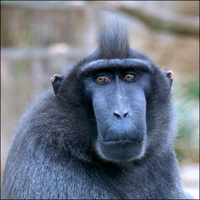
Country/State : Lille, FRANCE
Age : 60
Joined : 2010-04-01
Posts : 21168
 |  Subject: Re: Mathison Museum of Natural History Subject: Re: Mathison Museum of Natural History  Fri May 19, 2023 3:11 pm Fri May 19, 2023 3:11 pm | |
| A very nice one, even if I prefer the second paint job  |
|   | | rogerpgvg
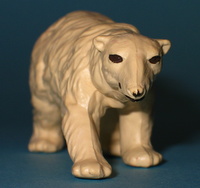
Country/State : UK
Age : 54
Joined : 2016-04-29
Posts : 3894
 |  Subject: Re: Mathison Museum of Natural History Subject: Re: Mathison Museum of Natural History  Sat May 20, 2023 9:38 am Sat May 20, 2023 9:38 am | |
| I agree, it looks good. I recently got the mini-version of the CollectA Komodo dragon. It has a livelier pose but I thought that it isn't so common for Komodo dragons to have their tail up, except in a fight. Or is it? |
|   | | bmathison1972

Country/State : Salt Lake City, UT
Age : 52
Joined : 2010-04-13
Posts : 6709
 |  Subject: Re: Mathison Museum of Natural History Subject: Re: Mathison Museum of Natural History  Sat May 20, 2023 12:44 pm Sat May 20, 2023 12:44 pm | |
| Species: Scolopendra sp. Common name(s): giant centipede About the Figure: Manufacturer: 4D Master Series: Bug & Creature World Year of Production: 2004 Size/Scale: Body length (excluding appendages) approximately 19.0 cm, within scale 1:1 for some species Frequency of genus in toy/figure form (at time of posting): Uncommon Miscellaneous Notes: Being a 'puzzle figure' substantial assembly is required. This particular model comes in 17 pieces and according to the accompanying paperwork, one is considered a beginner if it can be assembled in 12 minutes, average if it can be assembled in 8 minutes, and advanced if it can be assembled in 4 minutes. About the Animal: Geographic distribution: Worldwide in tropical and subtropical regions Habitat: Highly varied, including rainforests, subtropical forests, thornscrub, savanna, deserts Diet: Insects and other invertebrates; occasionally small reptiles, amphibians, and mammals IUCN Status (at time of posting): N/A [species dependent, but most if not all probably Not Evaluated] Miscellaneous Notes: Like other centipedes, members of the genus Scolopendra are venomous. The venom contains serotonin, hemolytic phospholipase, cardiotoxic proteins, and cytolysin. While human deaths from centipede bites are rare, they have occured with S. subspinipes and S. gigantea. [You must be registered and logged in to see this image.] |
|   | | Caracal
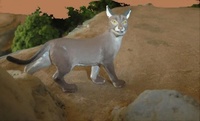
Country/State : France
Age : 65
Joined : 2018-10-24
Posts : 7252
 | |   | | widukind

Country/State : Germany
Age : 48
Joined : 2010-12-30
Posts : 45745
 |  Subject: Re: Mathison Museum of Natural History Subject: Re: Mathison Museum of Natural History  Sun May 21, 2023 9:58 am Sun May 21, 2023 9:58 am | |
| |
|   | | bmathison1972

Country/State : Salt Lake City, UT
Age : 52
Joined : 2010-04-13
Posts : 6709
 |  Subject: Re: Mathison Museum of Natural History Subject: Re: Mathison Museum of Natural History  Sun May 21, 2023 2:00 pm Sun May 21, 2023 2:00 pm | |
| Species: Sphyraena barracuda (Edwards in Catesby, 1771) Common name(s): great barracuda About the Figure: Manufacturer: Toy Fish Factory Series: Gulf Coast Collection Year of Production: 2019 Size/Scale: Body length 7.5 cm for a scale of 1:8-1:26.7 Frequency of species in toy/figure form (at time of posting): Rare Miscellaneous Notes: When I first acquired the Gulf Coast Collection, I didn't retain this figure, instead favoring the barracuda made by Kaiyodo for the Kurosio Komekko series. However, I ended up keeping this TFF model after all. For one reason, it is nice to have a complete Gulf Coast Collection and secondly, it really is a very nice rendition of the species! Also, the TFF figure is solid-piece and without a base, so there is little chance of breakage or pieces getting lost. About the Animal: Geographic distribution: Nearly worldwide in tropical, subtropical, and temperate coastal waters Habitat: Usually along the margins of coral reefs, at depths of 1-100 meters Diet: Other fish IUCN Status (at time of posting): Least Concern Miscellaneous Notes: Sphyraena barracuda is a popular game fish; however, there is a risk of Ciguatera fish poisoning (CFP) from eating its flesh. CFP is caused by the toxins ciguatoxin and maitotoxin. The barracuda acquires the toxin from eating herbivore fish, which have acquired the toxin from eating the phytoplankton Gambierdiscus toxicus. Symptoms of CFP include diarrhea, vomiting, headaches, numbness, itchiness, sensitivity to hot and cold, dizziness, weakness, and in some cases a slowed heart rate and low blood pressure. There is no specific treatment for CPF and some symptoms can persist for weeks or months to even years, sometimes resulting in long-term disability. Death is rare and most patients recover over time. [You must be registered and logged in to see this image.] |
|   | | widukind

Country/State : Germany
Age : 48
Joined : 2010-12-30
Posts : 45745
 |  Subject: Re: Mathison Museum of Natural History Subject: Re: Mathison Museum of Natural History  Sun May 21, 2023 8:08 pm Sun May 21, 2023 8:08 pm | |
| A figure from my favourite serie |
|   | | bmathison1972

Country/State : Salt Lake City, UT
Age : 52
Joined : 2010-04-13
Posts : 6709
 |  Subject: Re: Mathison Museum of Natural History Subject: Re: Mathison Museum of Natural History  Mon May 22, 2023 12:45 pm Mon May 22, 2023 12:45 pm | |
| Species: Pan paniscus Schwarz, 1929 Common name(s): bonobo; pygmy chimpanzee About the Figure: Manufacturer: Safari Ltd. Series: Primates TOOB Year of Production: 2019 Size/Scale: Scale difficult to calculate but head-and-body length approximately 3.7 cm for a scale of 1:19-1:22 Frequency of species in toy/figure form (at time of posting): Unique Miscellaneous Notes: I was hesitant to retain this figure as I would prefer a standard-sized version. If a major company ever produced a bonobo, I am likely to replace this one with it (although it is in the popular 1:20 scale range). About the Animal: Geographic distribution: Democratic Republic of the Congo (Congo Basin south of the Congo River) Habitat: Tropical rainforest, forested swamps, agricultural fields Diet: Primarily fruit, but also nuts, stems, shoots, pith, leaves, roots, tubers, flowers, mushrooms; rarely invertebrates or meat IUCN Status (at time of posting): Endangered Miscellaneous Notes: Pan paniscus and the common chimpanzee ( P. troglodytes) are the closest living relatives to modern humans. Different studies estimate the Pan- Homo divergence to be at different times. Molecular studies in 2006 suggest the divergence occurred approximately 6.3 million years ago (MYA) with continued interbreeding until about 4 MYA. Molecular studies in 2005 suggest the split between P. paniscus and P. bonobo occurred approximately 0.86-0.89 MYA, possibly due to the spread of savannas at the time; the two species are currently separated by the Congo River. In 2017, morphologic analysis focusing on the musculoskeletal structure suggest the Pan- Homo divergence was around 8 MYA and the split between P. paniscus and P. bonobo occurred about 2 MYA. [You must be registered and logged in to see this image.] |
|   | | widukind

Country/State : Germany
Age : 48
Joined : 2010-12-30
Posts : 45745
 |  Subject: Re: Mathison Museum of Natural History Subject: Re: Mathison Museum of Natural History  Mon May 22, 2023 5:31 pm Mon May 22, 2023 5:31 pm | |
| |
|   | | Roger
Admin
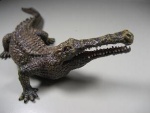
Country/State : Portugal
Age : 50
Joined : 2010-08-20
Posts : 35835
 |  Subject: Re: Mathison Museum of Natural History Subject: Re: Mathison Museum of Natural History  Mon May 22, 2023 5:35 pm Mon May 22, 2023 5:35 pm | |
| Most of us use the Nayab chimp as a bonobo because actually it is what it looks like and the size is standard and the figure is more realistic then many other chimps from major brands. |
|   | | bmathison1972

Country/State : Salt Lake City, UT
Age : 52
Joined : 2010-04-13
Posts : 6709
 |  Subject: Re: Mathison Museum of Natural History Subject: Re: Mathison Museum of Natural History  Mon May 22, 2023 9:10 pm Mon May 22, 2023 9:10 pm | |
| - Roger wrote:
- Most of us use the Nayab chimp as a bonobo because actually it is what it looks like and the size is standard and the figure is more realistic then many other chimps from major brands.
the Nayab chimp lacks certain bonobo-specific characteristics, such as the parted hair. I'd rather wait for one specifically marketed as such. |
|   | | Roger
Admin

Country/State : Portugal
Age : 50
Joined : 2010-08-20
Posts : 35835
 |  Subject: Re: Mathison Museum of Natural History Subject: Re: Mathison Museum of Natural History  Mon May 22, 2023 10:43 pm Mon May 22, 2023 10:43 pm | |
| - bmathison1972 wrote:
- Roger wrote:
- Most of us use the Nayab chimp as a bonobo because actually it is what it looks like and the size is standard and the figure is more realistic then many other chimps from major brands.
the Nayab chimp lacks certain bonobo-specific characteristics, such as the parted hair.
I'd rather wait for one specifically marketed as such. I understand and it makes sense considering your way of collecting. I think the Nayab model is a common chimpanzee wich works nicely as a bonobo but not a completely satifying one. Let's hope someone release this species, they can always call it pygmy chimpanzee which is more marketable, perhaps. |
|   | | bmathison1972

Country/State : Salt Lake City, UT
Age : 52
Joined : 2010-04-13
Posts : 6709
 |  Subject: Re: Mathison Museum of Natural History Subject: Re: Mathison Museum of Natural History  Tue May 23, 2023 1:19 pm Tue May 23, 2023 1:19 pm | |
| Species: Geothelphusa dehaani (White, 1847) Common name(s): Japanese freshwater crab About the Figure: Manufacturer: Epoch Series: Earth Life Journey Crabs and Shrimp Year of Production: unknown Size/Scale: Base 5.5 cm across its widest points. Carapace width approximately 2.5 cm, within scale 1:1 Frequency of species in toy/figure form (at time of posting): Uncommon Miscellaneous Notes: There have been multiple releases (at least three, possibly four) of Epoch's Earth Life Journey Crabs and Shrimp collections, each with a slightly different species composition and often consisting of re-releases with different paint jobs. A set typically has 6 or 7 figures in it. In all there are 10 species (9 crustaceans and 1 xiphosuran). I have collected mine individually over the years so I am not entirely sure which of mine came from which release. Today's G. dehanni comes in three pieces; the crab comes in two pieces plus a base. The crab sits loosely on its habitat-style base so there is no peg or other form of secure attachement. This crab also comes in at least one other color (blue). About the Animal: Geographic distribution: Japan Habitat: Montane forests, usually in riparian areas including clear streams and surrounding terrestrial habitats (under rocks and logs, in forest litter, etc.) Diet: General omnivore; primarily terrestrial and aquatic invertebrates and carrion, but occasionally plant material and detritus. Cannibalism not uncommon. IUCN Status (at time of posting): Least Concern Miscellaneous Notes: Geothelphusa dehaani is eaten in Japan and exported to other countries for human consumption. Eating raw or undercooked G. dehanni is an important risk factor for infection with lung flukes in the genus Paragonimus. [You must be registered and logged in to see this image.] |
|   | | widukind

Country/State : Germany
Age : 48
Joined : 2010-12-30
Posts : 45745
 |  Subject: Re: Mathison Museum of Natural History Subject: Re: Mathison Museum of Natural History  Tue May 23, 2023 7:01 pm Tue May 23, 2023 7:01 pm | |
| |
|   | | Kikimalou
Admin

Country/State : Lille, FRANCE
Age : 60
Joined : 2010-04-01
Posts : 21168
 |  Subject: Re: Mathison Museum of Natural History Subject: Re: Mathison Museum of Natural History  Tue May 23, 2023 10:32 pm Tue May 23, 2023 10:32 pm | |
| - bmathison1972 wrote:
- Roger wrote:
- Most of us use the Nayab chimp as a bonobo because actually it is what it looks like and the size is standard and the figure is more realistic then many other chimps from major brands.
the Nayab chimp lacks certain bonobo-specific characteristics, such as the parted hair.
I'd rather wait for one specifically marketed as such. - Roger wrote:
- bmathison1972 wrote:
- Roger wrote:
- Most of us use the Nayab chimp as a bonobo because actually it is what it looks like and the size is standard and the figure is more realistic then many other chimps from major brands.
the Nayab chimp lacks certain bonobo-specific characteristics, such as the parted hair.
I'd rather wait for one specifically marketed as such.
I understand and it makes sense considering your way of collecting. I think the Nayab model is a common chimpanzee wich works nicely as a bonobo but not a completely satifying one. Let's hope someone release this species, they can always call it pygmy chimpanzee which is more marketable, perhaps. I agree with Blaine,I really can't see a Bonobo when I look at the Nayab and I agree with Rogério, it should be great if a brave company would make a realistic Bonobo  |
|   | | Sponsored content
 |  Subject: Re: Mathison Museum of Natural History Subject: Re: Mathison Museum of Natural History  | |
| |
|   | | | | Mathison Museum of Natural History |  |
|
Similar topics |  |
|
| | Permissions in this forum: | You cannot reply to topics in this forum
| |
| |
| |
